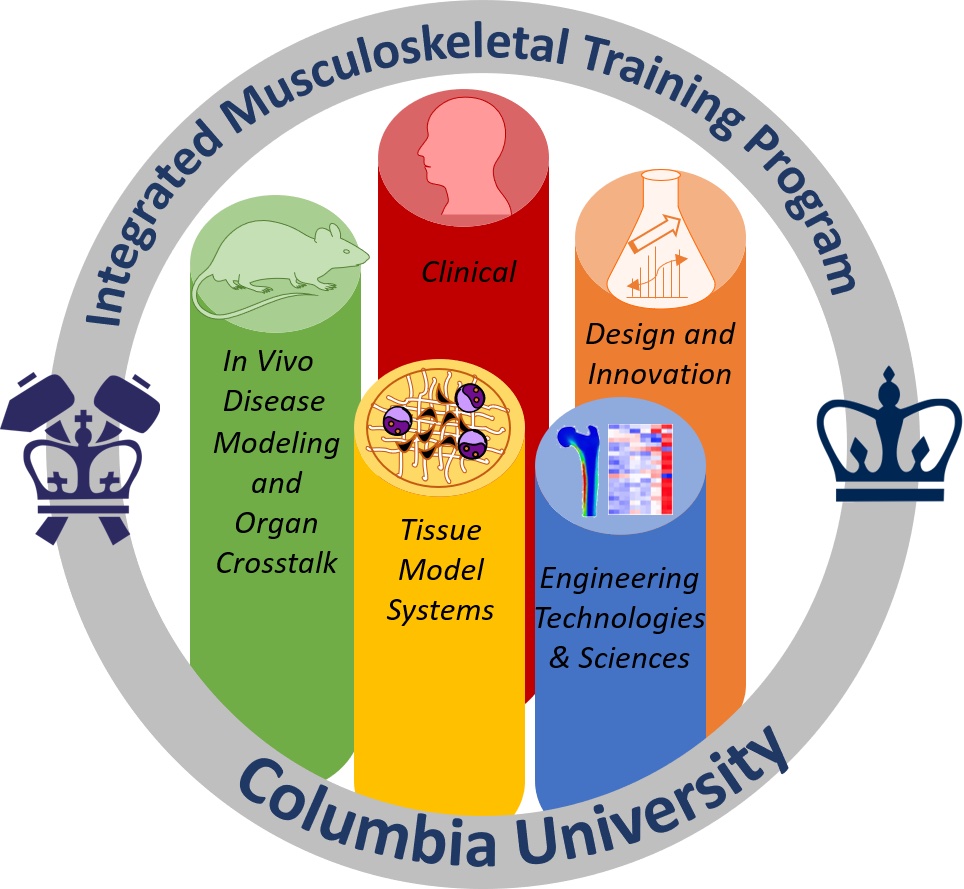Integrated Musculoskeletal Training Program (IMTP)
Columbia BME's NIH-funded T32 training program will establish a unique training paradigm in musculoskeletal disease with the following components:
- Clinical preceptorship in musculoskeletal medicine (orthopedic surgery, physical medicine and rehabilitation, rheumatology, radiology, etc.)
- Mandatory co-advising by a team consisting of a bioengineer, biologist, and a clinician
- Innovation and design training for identifying clinical needs and gaps in knowledge/technology
- Training in diversity and equity challenges
Musculoskeletal diseases and injuries continue to be the leading causes of disability worldwide, imposing an enormous socioeconomic burden on the health care system in this country. This era has also ushered in paradigm-shifting scientific revolutions in tissue engineering and regenerative medicine, in vivo and ex vivo disease modeling, sequencing and genomics, high-resolution imaging, and biomechanics. These developments at the bench side require multidisciplinary expertise in science, engineering, and medicine to continue accelerating the trajectory of musculoskeletal research to address unmet clinical needs at the bedside ultimately.
However, research training in musculoskeletal research continues to be largely siloed into single-discipline approaches and settings. The Integrated Musculoskeletal Training Program (IMTP) brings together world-leading musculoskeletal researchers and clinicians at Columbia University with expertise in biomedical engineering, cell and molecular biology, pathology and cell biology, mechanical engineering, and innovation. This unique predoctoral training program focuses on integrating the multiple disciplines required for cutting-edge research training of the next generation of scientists and engineers in the field.
This T32 training program will provide a unique and timely opportunity to promote, enhance, and deepen multidisciplinary musculoskeletal research by supporting trainees with the skills and values needed to enter the biomedical research workforce and to solve the complex problems of musculoskeletal disease in the future.

Funding Information
Each selected trainee will be eligible to receive up to two years of support. For each year of support, NIH provides $27,144 for the predoctoral stipend, $9,600 for tuition & fees, $1,000 for trainee travel, and $2,500 for childcare costs, as per NIH NRSA Policy for FY23. Additional funds to supplement the NIH NRSA level of trainee stipend and to conduct the proposed research will be provided by the IMTP training faculty/thesis advisor.
Eligibility for Trainees
Trainee must:
- Be a U.S. citizen, national, or permanent resident
- Have a baccalaureate degree or equivalent and are enrolled full-time in and training at the postbaccalaureate level in a program leading to a Ph.D. in the Departments of Biomedical Engineering, Mechanical Engineering, Genetics & Development, Physiology & Cellular Biophysics, or Pathology & Cell Biology at Columbia University.
- Have completed one year in their respective doctoral-degree granting program at Columbia University as of Fall 2023.
- Have good academic standing within the doctoral degree granting program and department
- Have an IMTP Training faculty member as a thesis advisor (see Mentoring Faculty in the next tab)
- Have a thesis project/proposal in the field of musculoskeletal research
- Have never earned a doctoral or terminal degree in any field
Mentoring Faculty
|
Name |
Degree(s) |
Rank |
Primary Department or Program |
Research Interest |
|
Agrawal, Sunil |
PhD |
Prof. |
Mechanical Engineering |
Robotics, Biomechanics |
|
Arinzeh, Treena |
PhD |
Prof. |
Biomedical Engineering |
Biomaterial & Tissue Engineering |
|
Ateshian, Gerard |
PhD |
Prof. |
Mechanical Engineering |
Cartilage Mechanics, Tissue Engineering |
|
Bathon, Joan |
MD |
Prof. |
Medicine, Rheumatology |
Rheumatoid Arthritis |
|
Chahine, Nadeen |
PhD |
Assoc. Prof. |
Orthopedic Surgery |
Intervertebral Disc, Mechanobiology, Disease Modeling, Tissue Engineering |
| Cohen, Adi | MD, MHSc |
Assoc. Prof. |
Medicine, Endocrinology | Osteoporosis, Bone Metabolism, Premenopausal Women |
|
Ducy, Patricia |
PhD |
Assoc. Prof. |
Pathology & Cell Biology |
Crosstalk, Skeleton, Brain, Pancreas |
|
Embree, Mildred |
DMD, PhD |
Asst. Prof. |
College of Dental Medicine |
Cartilage Biology, Osteoarthritis, Stem Cells, Regeneration |
| Giles, Jon | MD, MPH |
Assoc. Prof. |
Medicine, Rheumatology | Inflammatory Arthritis |
|
Guo, Edward |
PhD |
Prof. & Chair |
Biomedical Engineering |
Bone Biomechanics, Imaging |
|
Huang, Alice |
PhD |
Assoc. Prof. |
Orthopedic Surgery |
Tendon Development, Regeneration, Biology & Bioengineering |
|
Hung, Clark |
PhD |
Prof. |
Biomedical Engineering |
Cartilage Mechanobiology, Biomechanics, Tissue engineering |
|
Jaramillo, Diego |
MD MPH |
Prof. |
Radiology |
Pediatric Musculoskeletal Imaging |
|
Karsenty, Gerard |
MD, PhD |
Prof. & Chair |
Genetics & Development |
Skeletal Biology, Development, Physiology, Genetics |
|
Kousteni, Stavroula |
PhD |
Prof. |
Physiology & Cellular Biophysics |
Skeletal Functions in Metabolism & Hematopoiesis |
|
Lee, Chang |
PhD |
Assoc. Prof. |
College of Dental Medicine |
Meniscus and Tendon Regeneration |
|
Leong, Kam |
PhD |
Prof. |
Biomedical Engineering |
Gene Editing, Regenerative medicine, Drug and Gene Delivery |
|
Lu, Helen |
PhD |
Prof. |
Biomedical Engineering |
Interface Tissue Engineering, Biomimetic materials |
|
Nickolas, Thomas |
MD, MS |
Assoc. Prof |
Medicine- Nephrology |
Renal Osteodystrophy, Mineral and Bone Disorders |
|
Rubin, Mishaela |
MD, MS |
Assoc. Prof. |
Medicine- Endocrinology |
Skeletal Disease, Hypoparathyroidism, Diabetes |
|
Smeeton, Joanna |
PhD |
Asst. Prof. |
Rehabilitation and Regeneration Medicine |
Rehabilitation and Regeneration Medicine |
|
Thomopoulos, Stavros |
PhD |
Prof. |
Orthopedic Surgery |
Tendon Enthesis Development Mechanics, Regeneration |
|
Vunjak- Novakovic, Gordana |
PhD |
Prof. |
Biomedical Engineering |
Stem Cells, Tissue Engineering, Regenerative Medicine, ‘Organs On a Chip’ |
|
Worman, Howard |
MD |
Prof. |
Pathology & Cell Biology |
Nuclear Envelope and Muscular Dystrophy |
Application Process
The application form will require the following attachments to be provided in PDF format:
- CV or resume of the trainee
- Graduate school transcript
- Description of the proposed research project (4-page max) that must be relevant to musculoskeletal research. The research proposal should include subheadings for (a) Specific Aims, (b) Significance, (c) Innovation, and (d) Approach and Expected Outcomes.
- Letter of recommendation from the primary faculty advisor, who must be an IMTP training faculty member. Letters must address all 6 selection criteria described in section G. below (max 2 pages).
- a letter from the head of graduate studies of the student’s home department (max 1 page)
Selection Process
Applications will be reviewed by the IMTP Trainee Selection Committee, and the ranking of all applications will be shared with IMTP Program Director (PD) and Associate Program Director (APD). The PD and APD will review the top-ranking proposals and make final decisions on which applicants will be supported by the T32. Committee members who are in conflict with a given application (i.e., when the applicant is from the member's lab) are excluded from discussions.
Selection Criteria
The ranking of applications will be based on the following criteria and weights:
- Research potential and evidence of commitment to a long-term research related career (25%)
- Interdisciplinary nature of the project that leverages research collaborations across labs, departments, and/or areas of expertise (25%)
- Projects addressing new/novel questions in musculoskeletal research (15%)
- Applications from trainees who contribute to the diversity of the training program (15%)
- Application from trainees who exhibit leadership qualities including participation in leadership at the level appropriate for graduate students (10%)
- Academic performance during Year 1 of graduate school at Columbia University (10%)
Reappointment/Renewal
After completing the first year on the training grant, students will be considered for renewal for a second year based on the student’s progress using the following criteria:
- Minimum GPA of 3.2
- Active participation in at least 75% of IMTP activities/workshops
- Semesterly research performance rating of ‘good’ or ‘outstanding’ rated by the faculty advisor
- Progress toward submission of abstracts/manuscripts

Program Director: X. Edward Guo, Ph.D.

Program Director: Nadeen O. Chahine, Ph.D.
